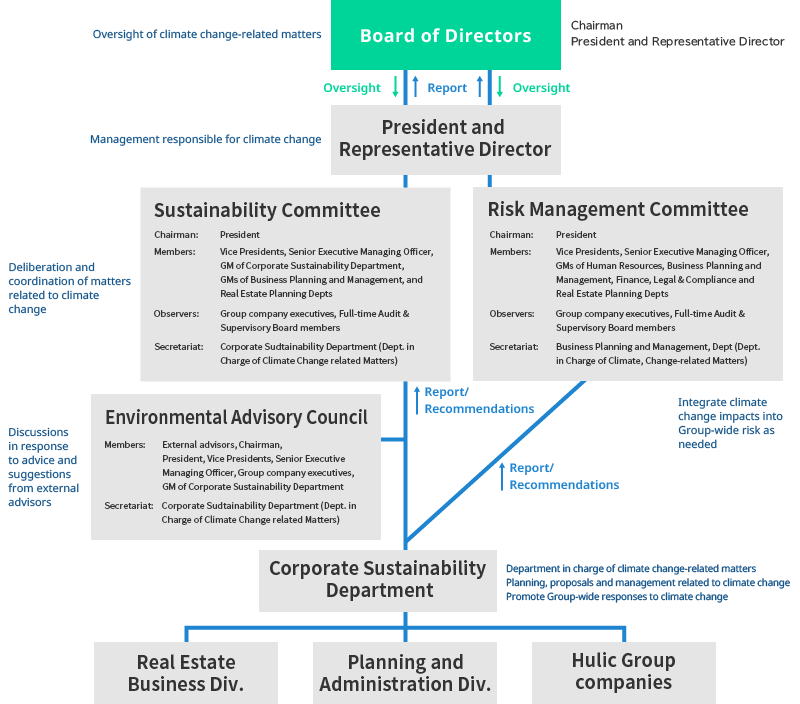Recognizing Hulic’s climate change response as an important management issue, we have established a corporate governance mechanism centered on Board of Director oversight and the Sustainability Committee. This governance mechanism is stipulated in the Basic Regulations on Climate Change.
Examples of Discussions and Decisions Made Under Our Climate Change-related Governance Structure:
- Supporting RE100 initiative and achieving by 2025 (Achieved in 2023, two years ahead of schedule)
- Developing Japan's first fireproof wooden 12-story commercial facility (Completed in October 2021)
- Supporting TCFD recommendations and disclosing information in line with the recommendations
- Achieving converting to 100% renewable energy for electricity consumption at all Company-owned Buildings*
- Formulating greenhouse gas (“GHG”) emissions reduction targets in conformance with SBTi (Science Based Targets initiative) criteria
- Development of renewable energy power generation equipments (solar and small hydropower), investment in wind power generation facilities and grid-scale batteries
- Reducing greenhouse gas emissions in the supply chain
- Analyzing financial impact of climate change and disclosure of the results
- *Excludes properties for which we do not have energy management authority including master lease properties, residential properties and non-managerial coownership properties, and real estate for sale, etc.
Board of Directors Oversight
The Board of Directors receives reports on climate change risks and opportunities from the Sustainability Committee at least once a year, and monitors and oversees the resolution of issues and setting of targets. In addition, important matters such as management strategies, management plans, annual budgets and profit targets are decided after consideration of climate change risks and opportunities when needed.
Refer to the link page below for more information on the skills of directors.
Sustainability Committee
Matters concerning climate change are deliberated and coordinated by the Sustainability Committee.
The Sustainability Committee, which is chaired by the President and Representative Director, who is responsible for climate change, is composed of the Vice Presidents, GM of Corporate Sustainability Department, GM of the Business Planning and Management Department, GM of the Real Estate Planning Department and Group company executives. The Committee evaluates the impact of climate change on business at least once a year, formulates policies and strategies for mitigating identified risks and seizing opportunities, and discusses how to adapt to climate change, including reflecting its impact in plans, budgets and targets. The Committee also sets KPIs related to sustainability, including climate change, and evaluates progress by reviewing performance.
Members
President, Vice Presidents,
GM of Corporate Sustainability Department,
GM of Business Planning and Management Department,
GM of Real Estate Planning Department
Observers
Group company executives, Full-time Audit & Supervisory Board members
Secretariat
Corporate Sustainability Department
Management Responsible for Climate Change
The President and Representative Director is responsible for the matters related to climate change. The President and Representative Director serves as the Chairman of the Sustainability Committee, and is ultimately responsible for assessments of the impact of climate change on Hulic business and manages appropriate responses. The Basic Regulations on Climate Change, which stipulate items related to climate change, are a matter for approval by the President.
Department in Charge of Climate Change-related Matters
Corporate Sustainability Department is in charge of climate change-related matters and is responsible for the planning, proposal and management of climate change-related items as well as the promotion of climate change responses throughout the Group.
Specific items include:
- Leading the monitoring of climate change impacts in conjunction with related departments within Hulic and Group companies, understanding status and submitting reports and recommendations on appropriate measures to the Sustainability Committee at least once a year.
- Designing processes to identify and assess the impact of climate change, managing identified impacts and integrating them into risk management across the organization.
- Developing indicators used to measure and manage the impact of climate change, and set goals, tracking performance and reporting progress to the Sustainability Committee at least once a year.
- Submitting reports and recommendations as needed to the Risk Management Committee regarding identified climate change impacts, and integrating them into Group-wide risk management.
Climate Change-related Corporate Governance Diagram

